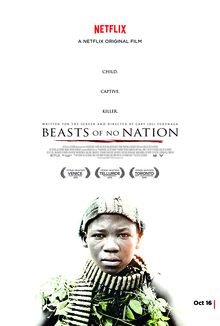Difference between revisions of "Beasts of No Nation (2015)"
Skalexsong (talk | contribs) |
|||
| (One intermediate revision by the same user not shown) | |||
| Line 1: | Line 1: | ||
| − | '''''Beasts of No Nation''' (''2015) is an American-Ghanaian war drama movie written, co-produced and directed by Cary Joji Fukunaga, about a young boy who becomes a child soldier as his country goes through a horrific war. | + | '''''Beasts of No Nation''' (''2015) is an American-Ghanaian war drama movie written, co-produced and directed by Cary Joji Fukunaga, about a young boy who becomes a child soldier as his country goes through a horrific war. The movie was created in Ghana and it features Idris Elba, Abraham Attah, Ama K. Abebrese, Grace Nortey, David Dontoh, and Opeyemi Fagbohungbe,.<ref>https://en.wikipedia.org/wiki/Beasts_of_No_Nation_(film)</ref> |
[[File:Beasts of No Nation poster.jpg|thumb|Beasts of No Nation poster]] | [[File:Beasts of No Nation poster.jpg|thumb|Beasts of No Nation poster]] | ||
<br /> | <br /> | ||
| − | == Plot == | + | ==Plot== |
| − | + | The movie tells a story of a young boy, Agu, who is compelled to join a group of soldiers in a fictional West African country. Agu often shows fear to his commander and men around him, his juvenile youth has been ruthlessly broken by the war seething through his country, and he is conflicted between revulsion and fascination Depicts the mechanics of war and doesn't avoid express, instinctive detail, and paints an intricate, troublesome image of Agu as a young warrior<ref>https://www.imdb.com/title/tt1365050/?ref_=ttpl_pl_tt</ref> | |
| − | == Controversy == | + | ==Controversy== |
| − | ''Beasts of No Nation'', shows more | + | ''Beasts of No Nation'', shows more harm to the African picture by persuading that Africa is exclusively a crude and war-torn spot, in this way proceeding with the negative generalizations of the land. There is a scene where the NDF and tribal elders yell at, beat, and even kill some of the initiates while they prepare to be part of the NDF. This gets back to the savage and crude generalization that is put on Africa. While it was an engaging scene to watch, it does nothing to represent how Africa is but rather shows the exotic Africa that viewers expect to see. Because of this, the message of the film, the severity of civil conflicts, is eclipsed by bigoted generalizations of the mainland.<ref>https://thetorohistoricalreview.org/2017/04/24/the-primitive-beasts-of-a-war-torn-nation-a-film-analysis-of-beasts-of-no-nation/</ref> |
| − | + | Going deep into the movie, it will shows more and more things about "monsters" that feel somehow untrustworthy, or at least not immediately defensible. The title which contains the word "Beasts" is referred to dark-skinned people, African, or African-American that are shown in the film whereas the film was directed by a white person.<ref>https://www.rogerebert.com/reviews/beasts-of-no-nation-2015</ref> | |
| − | == Reference == | + | ==Reference== |
| − | [[Category:Black Racism in Drama Movies]] | + | [[Category:Black-Targeted Racism in Drama Movies]] |
| + | <references /> | ||
Latest revision as of 06:34, 15 March 2021
Beasts of No Nation (2015) is an American-Ghanaian war drama movie written, co-produced and directed by Cary Joji Fukunaga, about a young boy who becomes a child soldier as his country goes through a horrific war. The movie was created in Ghana and it features Idris Elba, Abraham Attah, Ama K. Abebrese, Grace Nortey, David Dontoh, and Opeyemi Fagbohungbe,.[1]
Plot
The movie tells a story of a young boy, Agu, who is compelled to join a group of soldiers in a fictional West African country. Agu often shows fear to his commander and men around him, his juvenile youth has been ruthlessly broken by the war seething through his country, and he is conflicted between revulsion and fascination Depicts the mechanics of war and doesn't avoid express, instinctive detail, and paints an intricate, troublesome image of Agu as a young warrior[2]
Controversy
Beasts of No Nation, shows more harm to the African picture by persuading that Africa is exclusively a crude and war-torn spot, in this way proceeding with the negative generalizations of the land. There is a scene where the NDF and tribal elders yell at, beat, and even kill some of the initiates while they prepare to be part of the NDF. This gets back to the savage and crude generalization that is put on Africa. While it was an engaging scene to watch, it does nothing to represent how Africa is but rather shows the exotic Africa that viewers expect to see. Because of this, the message of the film, the severity of civil conflicts, is eclipsed by bigoted generalizations of the mainland.[3]
Going deep into the movie, it will shows more and more things about "monsters" that feel somehow untrustworthy, or at least not immediately defensible. The title which contains the word "Beasts" is referred to dark-skinned people, African, or African-American that are shown in the film whereas the film was directed by a white person.[4]
Reference
- ↑ https://en.wikipedia.org/wiki/Beasts_of_No_Nation_(film)
- ↑ https://www.imdb.com/title/tt1365050/?ref_=ttpl_pl_tt
- ↑ https://thetorohistoricalreview.org/2017/04/24/the-primitive-beasts-of-a-war-torn-nation-a-film-analysis-of-beasts-of-no-nation/
- ↑ https://www.rogerebert.com/reviews/beasts-of-no-nation-2015
